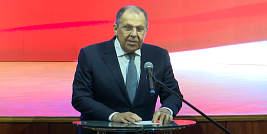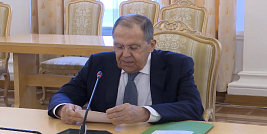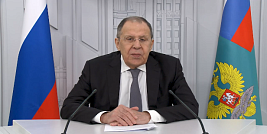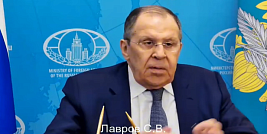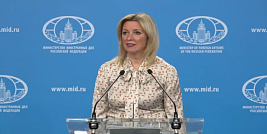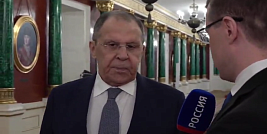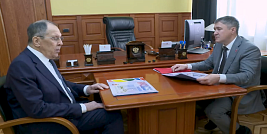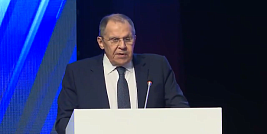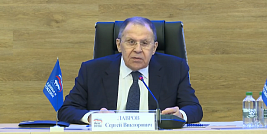Foreign Minister Sergey Lavrov’s remarks and answers to media questions following a ministerial meeting of the 3+3 Consultative Regional Platform for the South Caucasus, Tehran, October 23, 2023
The 3+3 Group ministerial meeting has concluded. The group was formed at the initiative of Baku and Ankara with an eye towards promoting cooperation between three South Caucasus countries (Azerbaijan, Armenia, and Georgia) and their three large neighbours (Russia, Türkiye, and Iran).
The first meeting in this format took place in Moscow at the deputy ministerial level back in December 2021. During that meeting, Russia, as the host, presented its vision of practical cooperation projects in various areas, including the economy, energy, trade, transport, ICT, natural resources, humanitarian affairs, education, culture, and tourism.
Agreements have been reached on all these areas of focus. The parties have agreed that participating countries would appoint special representatives to formulate national ideas within each of these areas to be further coordinated by our Turkish colleagues, who will host the second ministerial meeting scheduled to be held in the first half of 2024.
Specific assessments and agreements will be announced by Foreign Minister of the Islamic Republic of Iran Hossein Amir-Abdollahian.
We paid close attention to the geopolitical situation in the region and expressed satisfaction with the normalisation processes between Azerbaijan and Armenia, Azerbaijan and Iran, and Armenia and Türkiye. Russia strongly supports these efforts and will continue to do so.
We couldn’t leave out the situation in Palestine. Our positions are close. Russia does not accept any manifestations of terrorism and violence that go against international humanitarian law, including the indiscriminate use of force. We believe that taking people hostage and blockading areas with civilians should be avoided. This is a well-known position. We shared our assessments of how this issue is addressed in the UN Security Council and received support from our 3+3 format partners.
All these considerations will be reflected in the final statement to be presented by Iran. Everyone agreed that the door remains open for Georgia to join our format. We understand the reasons for the Georgian leadership's hesitation to join the group. We appreciate the fact that Tbilisi contemplates the possibility of doing so in the future (as we understand it). In any case, the current Georgian authorities are guided in all their actions by their fundamental national interests, which they have repeatedly demonstrated. This gives us reason to believe that the full-fledged 3+3 format may become a reality in the near future.
Question: The 3+3 initiative was advanced by Baku and Ankara. What can you say about Yerevan's attitude towards it? Do Azerbaijan and Armenia see this format as a full-fledged platform for resolving the Armenian-Azerbaijani conflict? How does Moscow view this format?
Sergey Lavrov: Armenia has a positive attitude towards this platform, as it is a participant.
Regarding this format’s attitude to the ongoing developments between Yerevan and Baku, the conflict has largely been resolved. Both sides have agreed that Nagorno-Karabakh is part of Azerbaijan, which was the primary outstanding issue.
Currently, it remains to make some practical steps in order to achieve full normalisation of relations, primarily, the preparation of a peace treaty, border delimitation, and the establishment of unobstructed transport and economic connections. This was agreed upon during meetings between President Vladimir Putin, President of Azerbaijan Ilham Aliyev, and Prime Minister of Armenia Nikol Pashinyan. These aspects of Armenian-Azerbaijani relations are not directly discussed in the 3+3 format. There are other channels, agreed upon by the parties, for these discussions as well.
Russia plays a coordinating role in these processes. This additional – on top of the CIS and other formats – platform involving Baku and Yerevan is aimed at expanding positive trends and creating proper conditions for the sustainable development of the entire region, and objectively helps address the remaining issues in Azerbaijan-Armenia relations.
Question: The Foreign Ministry has repeatedly called for starting the border-delimitation process. After Nagorno-Karabakh was abolished as a republic, Yerevan said it was ready to start this process. Are all conditions in place to move towards a peaceful agreement between Baku and Yerevan? What or who is in the way?
Sergey Lavrov: Delimitation was the subject of a separate agreement between Moscow, Baku, and Yerevan. The Armenians and Azerbaijanis agreed to establish a delimitation commission in which Russia, with their consent, would participate as a consultant. Unfortunately, the commission has not met for a long time. Although, indeed, there have been attempts over the past year (and they continue) by the United States and, primarily, the EU to get involved in the delimitation process.
Russia is not against any contacts that Armenians and Azerbaijanis consider useful. But experts are well aware that only the Russian Federation has all the necessary materials for discussing and agreeing on delimitation, including maps dating back to the Soviet times. Our partners are aware of this. We are not trying to make a problem out of it. Let them try their luck in Brussels, if they wish. But we are always there to help them start practical delimitation.
Question: The Gaza Strip is in the spotlight. US Secretary of State Antony Blinken stated that they are prepared to act in case of an escalation caused by third, pro-Iranian, forces. There was another high-profile statement that it won't be possible to return to the mechanism that existed before, the status quo between Israel and the Gaza Strip. A new mechanism is needed, but Blinken does not specify what kind of a mechanism. Do you agree with this? What is this formula for the future? What might it look like?
Sergey Lavrov: Regarding US Secretary of State Antony Blinken’s forecasts concerning the intervention of third forces in this conflict, the United States is among those who are already intervening. This includes sending two aircraft carrier groups and several thousand troops with all the necessary equipment, including heavy weapons, to the conflict zone. The more such go-ahead steps are made by any state, the higher the risk and danger that the conflict will escalate.
We are convinced that the first and indispensable step should be a ceasefire, the resolution of humanitarian issues, and assistance in evacuating foreign citizens from the Gaza Strip. Then, a mechanism will be needed to evaluate the situation in a broader context. We have been talking about it for decades at the UN. The international community (and this remains a fact) has affirmed and continues to reaffirm its commitment to the two-state solution. This is the so-called two-state resolution of the issue, where two fully sovereign states, Palestine and Israel, will live side by side in neighbourliness, peace, and security with each other and all other neighbours. As you know, this plan is enshrined in a series of UN Security Council resolutions and in the Arab Peace Initiative put forth by Saudi Arabia in 2002. It was approved by all Muslims and welcomed by other members of the international community. This plan was embodied in agreements whereby the relevant direct talks would be coordinated by four players: Russia, the United States, the UN, and the EU, known as the quartet of international mediators. The United States has for many years blocked this mechanism, attended meetings without bringing anything to the table and made no attempt to identify the steps that would help implement the UN Security Council resolution regarding the borders of the future Palestinian state, its capital, or addressing refugee and water supply issues. All of this is spelled out in the UN Security Council resolution. In the past couple of years, the United States has terminated the work of the quartet. Currently, there is no other authority that would be acceptable to everyone. Secretary Blinken may have some brilliant ideas on this matter, but we are unaware of them.
I’m convinced that acting unilaterally, as the United States has tried to do for many years, no one will be able to reconcile Palestinians and Israelis. We need to act relying on the collective potential of the countries in the region, the EU, and the United States (it will be hard to do without them here as well). Collective, not unilateral action is needed.
Question: Some Palestinian and Israeli politicians claim that Russia could become a mediator in negotiations between Israel and Palestine. Does Russia plan to put forward a peace initiative any time soon? If so, when, and what key principles will this initiative reflect?
Sergey Lavrov: As I just mentioned, unilateral mediation efforts are unlikely to help in this situation. Russia was part of a mediation mechanism in the form of the quartet of international mediators. Our country is still ready to help in every way to stop the bloodshed and to move on to discussions of a long-term solution based on the UN Security Council resolution. We do have good relations with Israel and Palestine. President Putin has consistently emphasised in his international speeches on the Middle East our special commitment to ensuring the security of Israel. Anywhere from 1.5 to 2 million of our citizens live there.
We are aware of the geopolitical circumstances of that country. We understand that it needs peace as much as its neighbours. This includes Syria, Lebanon, and the Palestinians, who have been prevented from establishing their own state promised to them by the entire progressive humanity back in the late 1940s for over 75 years now.
Not long ago, our Turkish colleagues put forward an idea that countries with influence over the parties to the conflict should appoint their guarantors who could unite and coordinate certain recommendations for the parties. Today, I asked my Turkish counterpart, Foreign Minister Hakan Fidan, to specify this idea. We will see. In any case, the thoughts are moving in the right direction towards collective actions.
Question: What stage is the new Russian-Iranian comprehensive strategic partnership agreement at now? Earlier, there were suggestions that the document could be concluded by the end of the year. Can the timing or the content be affected by the escalation in the Middle East?
Sergey Lavrov: The work on the new comprehensive agreement is at an advanced stage. About 85 percent of it has been agreed upon. There are certain specific issues that are being negotiated. I won't commit to specific deadlines. For us, the result always mattered more than artificial deadlines. And it does in this case, too. I don't see any direct impact in any form of what is happening between the Palestinians and Israelis on our negotiating process with the Islamic Republic of Iran.
Today, during the meeting with President of Iran Ebrahim Raisi, we reiterated our commitment to concluding work on this new document as soon as possible.
